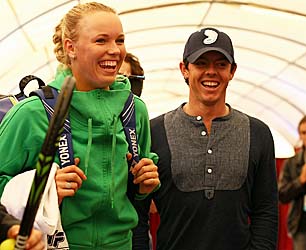John Daly: "I think I may get in trouble for saying this, but..."
/John Daly was in the group at 69 along with Lee Westwood, Retief Goosen, Y.E. Yang and Robert Karlsson.
"With a small field like we have here, and I think I may get in trouble for saying this, but I'm kind of glad it's not sanctioned by the European or PGA Tour," Daly said. "It shows that China is doing something on their own. They're saying, 'Hey, we may not need the PGA Tour or European Tour, no disrespect."
When did China become IMG? Or IMG become China?

















